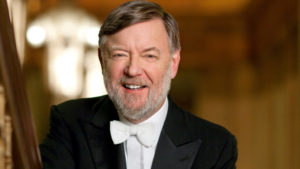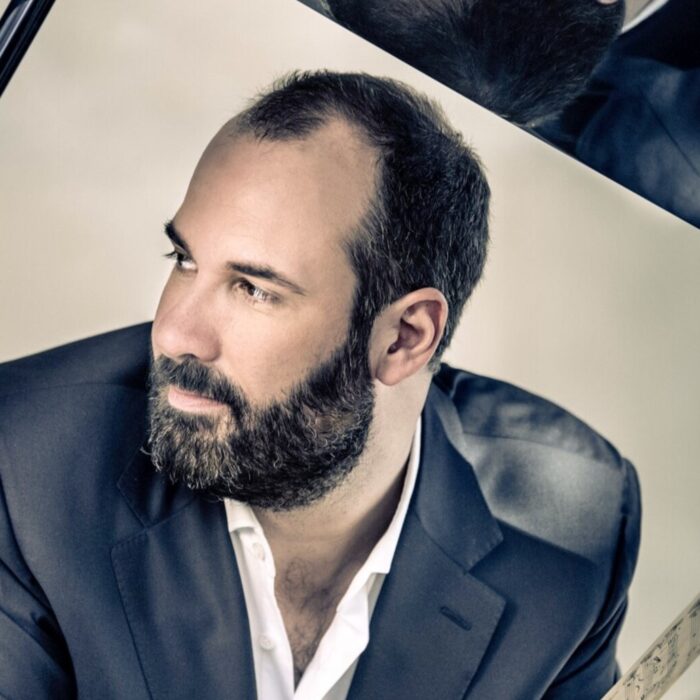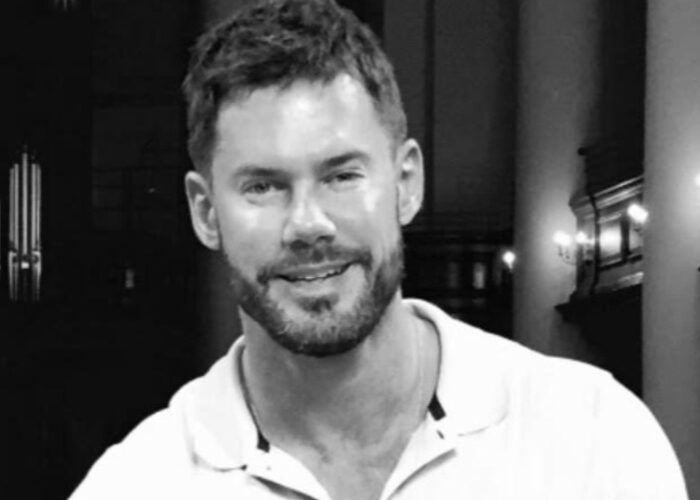
Q & A: Sir Andrew Davis on Conducting The Ring Cycle in Chicago
By Francisco SalazarEver since 2000, Sir Andrew Davis has served as the Music Director and principal conductor for the Lyric Opera of Chicago. He has led a diverse repertoire from Mozart and Rossini to Tchaikovsky and Stravinsky with the company and has established the orchestra as one of the greats in the United States and the world.
He has also led the Chicago production of Michael Tippett’s “The Midsummer Marriage” and performed his first and only Ring Cycle in 2005 celebrating the company’s 50th anniversary. Last year the conductor announced that the 2020-21 season will be his final one as music director, ending a now legendary association.
After 15 years, the conductor will end his penultimate season with the company conducting his second career Ring Cycle in a new production by David Pountney that he and the company have been developing for the past three years.
Sir Andrew Davis spoke with OperaWire about conducting the epic masterpiece for the first time and the joys of Wagner’s music.
OperaWire: You’re finishing this season conducting your second Ring Cycle. What does it mean to be doing this in your penultimate season as Music Director of the Lyric Opera of Chicago?
Sir Andrew Davis: My original plan was to leave after the Ring but Anthony Freud said, “I’d like you stay another year.” So I said okay. And I am ending next season with two of my favorite operas which are “The Marriage of Figaro” and “The Rake’s Progress.”
But with the Ring it is the Mount Everest of Opera and it is a very exciting piece. The last time we did it was 15 years ago, which was a revival of a production done in the 90s. And as you know we have been building the cycle for the last three years and I have been very excited about what David Pountney has been doing with the operas. And now we’re doing the full cycle and this will be my second time. It is extraordinary and it is beyond anything that was written in the operatic canon.
What strikes me and what astonishes me is that while he was writing this cycle, he took time off to write “Tristan und Isolde” and “Meistersinger.” It’s astonishing to see that self-confidence that Wagner had and the result was “Götterdämmerung,” which is on a different plane than the others. Considering the time span that it was written in with “Das Rheingold” being simpler musically, you don’t get this sense that the style changed that much. It hangs together so well.
OW: Over the past three years, the company has been building towards the full Ring Cycle. Can you tell me about the work that you and David Pountney have been doing and how it has evolved for this full Ring Cycle?
AD: The production is all presented in a theater of which you see the workings. There are four big towers at the side of the stage which can be moved around and the characters on them sometimes. The giants are actually represented by huge limbs that are attached to these towers. And then there are lifts on a pivot which is used for the Rhinemaidens and the Valkyries and Brünnhilde’s horse. And it has been very exciting because there is a lot of work for stage hands.
I also love it because it’s not one of those productions that is only about the set. It’s about characters and their relationships and David has been very wonderful. He has a visual and novel way of approaching it and it is very true to the drama and psychology of the work. One gets very involved with the characters as it should.
OW: How do you think the production integrates with the music and how does it make your job easier when working with the singers and music?
AD: There have been occasions when David and I have had disagreements where he is putting people on the stage and then we negotiate. Sometimes I win and sometimes he wins and then we find a compromise. But ultimately that is normal with any production.
What I like is that he brings years of experience although this is the first time he has directed a Ring Cycle. I remember that when Anthony Freud and I decided that we wanted to ask David to do the Ring, we called him and he said, “Well I was beginning to think I was never going to do one.” So I think he was really thrilled and he is lovely to work with. He experiments but he is always good with our time and very well prepared. His choreographers and assistants are so totally integrated into the process so that is wonderful to see.
OW: You’ve only done one other Ring Cycle but how has your interpretation of the work changed since you first did it?
AD: When I came in 2000, the only Ring I had done were parts of “Die Walküre” and “Götterdämmerung.” Then I conducted concert performances of “Walküre” in 2017 and “Götterdämmerung” in 2019, which was phenomenal. I was happy to have done “Götterdämmerung” like that because it eased the pressure of doing it for the first time since 2005.
While it is hard to say that my interpretation has changed, there are some things that I sort of would agonize over how to do then but now everything seems rather obvious and that is encouraging. That means I have a better grasp of the work and the relationship as a whole. I ultimately feel more spontaneous even though I don’t have a complete grasp of the whole structure yet.
OW: What are your favorite parts of the entire work?
AD: The opening of “Rheingold” is extraordinary because you start with E flat major which grows and grows and it is a perfect metaphor for the death of the Rhine. In “Walküre,” the whole love music is incredible and then in the second act, the Siegmund/Brünnhilde scene is wonderful. It is challenging because of the way you structure that scene and the way it has to move forward is something that is a test for a conductor. The whole thing could die if it doesn’t have the correct momentum. Then there is Wotan’s farewell and the magic fire music.
I am very fond of the whole first act of “Siegfried” which is very much like the scherzo of the Ring. I also adore the woodbird section which has an intimacy to it.
And then “Götterdämmerung” is on a different level. The whole prologue through the Siegfried and Brünnhilde duet and the Ride journey are incredible and then the opening of Act two features some of the most black and evil music that exists. A friend of mine once said that Wagner could reach into the depths of our terrifying life that most would shy away from. That scene has immense power because of its evil and terrifying characters. Then of course from Siegfried’s funeral to the end is the culmination of the entire cycle and not a second disappoints. It’s some of the best music ever written.
OW: Wagner’s work is filled with leitmotifs. How do you think he evolved throughout the entire four operas in his style and composition?
AD: While he stopped for a few years, he was able to preserve the integrity and coherence of the work. “Götterdämmerung” benefited from everything he developed beforehand. You can see that in the subtly of orchestration and the complexity of the work and in a way the virtuosity of the orchestral playing.
And what is remarkable is how you don’t hear a change in style with “Götterdämmerung.” And that is partly dictated by the use of the Leitmotifs which remain constant throughout. I don’t think stylistically you are aware of any changes. But I don’t know and I couldn’t tell you where he stopped composing it. I have my ideas and the consistency is remarkable. But it’s so unique and unified and it takes you on an extraordinary journey.
OW: You talked about pacing the music correctly so you could get the full effect. What are the challenges of these four operas and how do you pace yourself when conducting them in a full cycle?
AD: Stamina is important. As I mentioned the Brünnhilde and Siegmund scene, that starts out slowly and it has to move. Wagner doesn’t give you instructions on how to do it. Actually in a lot of the Ring, there are many tempo fluctuations and there are subtle differences in a scene that he doesn’t tell you about which depends on the text. You have to be very sensitive to that. A slight adjustment in the metronome mark will take you into another emotional world.
Those are the things that make me wish I had conducted the Ring more often because if you know where each piece in the puzzle goes you could be freer. When you have a feeling of the totality of the whole piece, you can be more spontaneous.
OW: Do you find that you are freer because he doesn’t write in tempo markings?
AD: My tempi tend to be on the fast side and when I conducted “Götterdämmerung” in Edinburgh my first act came in under two hours, which is quite short. When I conducted “Lohengrin” in Bayreuth, I auditioned someone for Ortrud and they sang from the Waltraute scene. I think the Waltraute scene, which is at the end Act one, can be one of the most boring things you have heard in your life. He reiterates everything again.
But in Edinburgh with Christine Goerke and Karen Cargill, it was one of the most riveting scenes in the performance. That scene depends on the artists but also how the conductor moves it. There are places where Wagner tells you to get a move on and if you ignore that it’s to your peril.
OW: You have worked with this cast over the past years. How has it been to work with this group of singers?
AD: Christine Goerke is extraordinary because she lives the text and she has thought so much about what Brünnhilde’s emotional and psychological state is at any given point. So she brings a depth to the character that is incredible. Vocally she is magnificent. She is singing brilliantly right now and she has everything you would look for in a Brünnhilde.
I love Burkhard Fritz as Siegfried because he sings with delicacy and he delivers in a way that I have seldom heard. Most of the tenors have stentorian voices who can’t do that. His voice is not the biggest but I think it’s growing and getting more brilliance and he is capable of bringing so much nuance. I think it gives the character so much more depth in a way that we are not used to.
There is great strength all the way through.
OW: The cast is mixed with rising stars and more experienced singers. Do you find that brings different qualities to the piece?
AD: I really like that because you can get all varieties of vocal timbres. From the more mature artists to the fresher type of voices. One of the things I love about this house is the atmosphere for work is extraordinary and the way everyone collaborates feels like a huge family. I think when visiting artists come in, they feel that.
But all overall the commitment of the cast and the rehearsal process of the cast has been wonderful. I think the Ring has given people so many different experiences and I think this can be a transformative experience.


